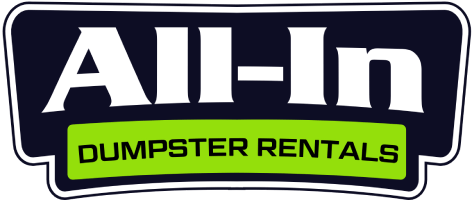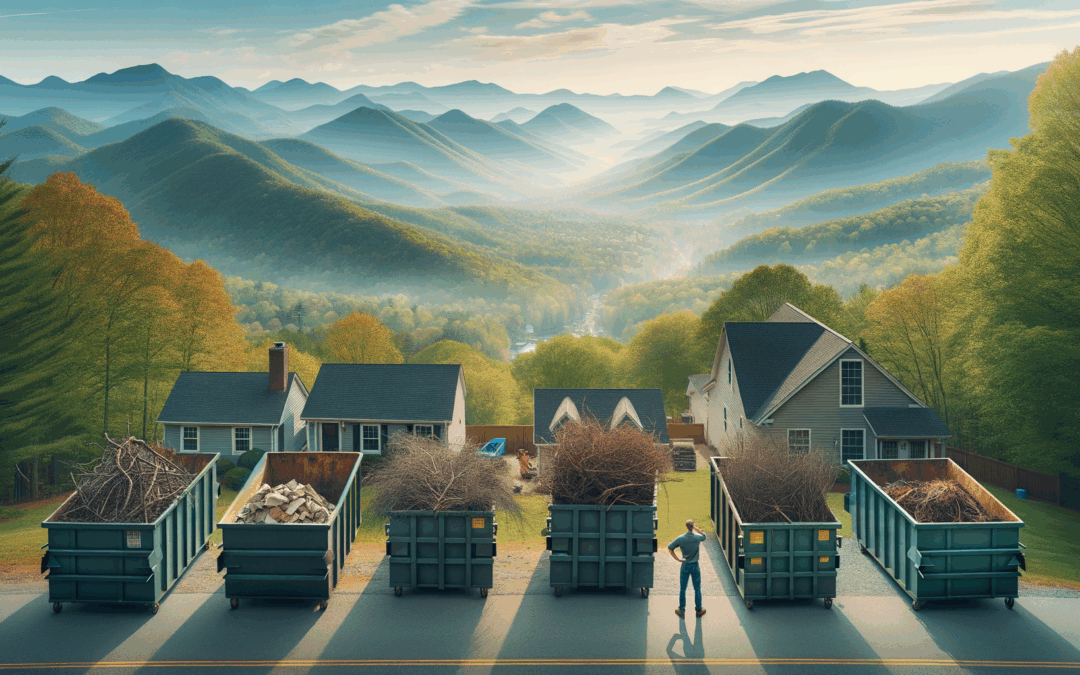When the mountains of Western North Carolina burst into their seasonal displays of color, many Asheville homeowners feel inspired to tackle those landscaping projects they’ve been putting off. Whether you’re clearing overgrown brush, removing dead trees, or completely redesigning your outdoor space, one question inevitably arises: what do you do with all that yard waste?
Here in Asheville, our unique mountain landscape presents both opportunities and challenges for yard work. The lush vegetation that makes our region so beautiful also means we generate substantial organic waste during landscaping projects. As a local family-owned business serving Buncombe, Henderson, Haywood, and Madison counties, we’ve helped countless neighbors manage their yard waste efficiently and responsibly.
The rolling hills of Asheville neighborhoods like Montford, West Asheville, and East Asheville are dotted with homes surrounded by mature trees, flowering shrubs, and naturalized gardens. When homeowners take on landscaping renovations, they’re often surprised by just how quickly organic debris piles up. That’s where selecting the right dumpster for your specific yard waste needs becomes crucial.
Understanding Different Types of Yard Waste
Before choosing a dumpster, it helps to understand what types of yard waste you’ll be dealing with. Asheville properties typically generate several categories:
Green waste includes grass clippings, fresh leaves, and soft plant materials. This type breaks down quickly but can become heavy when wet – something to consider given our region’s rainfall patterns.
Woody waste encompasses branches, limbs, and small tree trunks. This material is bulkier but lighter than green waste, requiring more volume but less weight capacity.
Soil and root balls from removed plants can be surprisingly heavy. One cubic yard of soil can weigh over 2,000 pounds – an important consideration when choosing a dumpster size.
Mixed landscaping debris often includes non-organic elements like old landscaping fabric, worn-out garden hoses, or broken planters that need disposal alongside plant material.
Each Asheville neighborhood has its own characteristic landscape challenges. Properties in North Asheville often feature mature hardwoods that drop substantial leaf volume, while South Asheville homes might be dealing with more ornamental landscaping debris.
Sizing Up Your Landscaping Project
Estimating the volume of yard waste your project will generate helps determine the appropriate dumpster size. Here’s a practical way to gauge your needs based on common Asheville landscaping projects:
Small yard refreshes (removing a few shrubs, trimming established trees, or clearing a small garden bed) typically generate 2-3 cubic yards of debris. Our 10-yard dumpster is often perfect for these modest projects.
Medium landscape renovations (removing several larger shrubs, clearing overgrown beds, or pruning multiple trees) can produce 5-7 cubic yards of waste. For these projects, our 13-yard dumpster provides the right balance of capacity without overwhelming your property.
Major yard overhauls (removing small trees, completely redesigning large garden areas, or clearing heavily wooded sections) often generate 10+ cubic yards of debris. Our 15-yard dumpster is designed to handle these substantial projects.
Remember that yard waste in the Asheville area can be heavier than you might expect. Our region’s rich, clay-heavy soil adds significant weight when attached to root balls or mixed with plant material.
Weight Considerations for Yard Waste
Unlike household junk or construction debris, yard waste presents unique weight challenges. Weight restrictions matter because they affect both transportation safety and disposal fees.
Wet yard waste can be deceptively heavy. After one of our famous Asheville afternoon thunderstorms, freshly cut grass and green plant material can double in weight. If your landscaping project spans several days, consider timing your heavy loading during drier periods.
Root balls and soil are particularly weighty components. A single large root ball from a medium-sized rhododendron (a common shrub in our area) can weigh over 200 pounds when the attached soil is damp.
To manage weight effectively, distribute heavier items evenly throughout the dumpster rather than concentrating them in one area. This prevents shifting during transport and helps avoid exceeding weight limits.
For projects involving substantial amounts of soil or heavy organic material, you might consider splitting the disposal between two smaller dumpsters rather than filling one larger container beyond its weight capacity.
Special Considerations for Asheville Residents
Our mountain community has some unique factors that affect yard waste disposal decisions:
The steep driveways characteristic of many Asheville homes can limit dumpster placement options. Our local team understands these constraints and can help identify the safest, most accessible location for your dumpster delivery.
Asheville’s commitment to environmental stewardship means many residents prefer eco-friendly disposal methods. We partner with facilities that properly process yard waste for composting or mulching when possible, rather than sending it to landfills.
Seasonal considerations matter in our region. Fall leaf cleanup projects can fill dumpsters quickly but with relatively light material. Conversely, spring projects often involve heavier, denser waste from winter storm damage or new planting preparations.
Local regulations may restrict certain types of yard waste disposal, particularly for invasive species like kudzu or bamboo. Our team stays current on these regulations to ensure your disposal complies with all requirements.
Dumpster Options for Different Yard Projects
Based on our experience serving the Asheville community, here’s how our different dumpster sizes typically match up with common landscaping projects:
10-Yard Dumpster: Perfect for focused projects like removing a single tree, clearing a specific garden area, or refreshing small landscaped sections. This size works well for most standard residential lots in neighborhoods like Kenilworth or Oakley.
13-Yard Dumpster: Our most versatile size for yard waste, providing enough capacity for medium-sized projects without requiring excessive space on your property. This is often the right choice for homes in areas like Beverly Hills or Montford with moderate-sized yards.
15-Yard Dumpster: Ideal for comprehensive landscape renovations or clearing larger properties. This size is commonly requested by homeowners in areas like Biltmore Forest or larger properties in Leicester where projects tend to be more extensive.
For properties with access challenges, we can recommend alternative solutions or special placement strategies to ensure you can still complete your landscaping project efficiently.
Preparing Your Yard Waste for Dumpster Disposal
To maximize your dumpster’s capacity and keep disposal costs manageable, consider these preparation tips specifically relevant to Asheville yards:
Break down bulky items whenever possible. Cutting branches into smaller sections allows for more efficient loading and better use of space. This is particularly important when dealing with our region’s abundant rhododendrons and mountain laurels, which have dense, sprawling branch structures.
Allow freshly cut green waste to dry for a day or two before loading if weather permits. This can significantly reduce weight, especially during our humid summer months.
Separate different types of materials when possible. Keep soil and heavy materials on the dumpster floor, with lighter brush and branches on top. This prevents compaction that can limit your capacity.
Consider whether some materials might be reusable. Hardwood branches can be seasoned for firewood (a valuable resource during our mountain winters), and some clean yard waste can be composted on-site.
Remember that certain items shouldn’t go in yard waste dumpsters, including treated lumber, railroad ties, and chemical containers. These require special disposal methods to protect our local waterways and natural areas.
Timing Your Dumpster Rental for Landscaping Projects
Strategic timing can make your yard project more efficient and economical:
Schedule your rental during Asheville’s drier seasons when possible. Late spring and early fall offer ideal conditions – comfortable working temperatures and typically less rainfall than summer or winter.
For major projects, consider booking your dumpster mid-week. Weekend availability can be limited, especially during peak landscaping seasons when many homeowners are tackling outdoor projects simultaneously.
Allow yourself enough time. Landscaping projects often uncover unexpected challenges, particularly in our mountainous terrain where rocky soil or hidden root systems can slow progress. Building in an extra day or two for your rental period can reduce stress and rushed work.
Plan for weather contingencies. A sudden mountain shower can halt yard work temporarily, so check the forecast and have a flexible timeline when possible.
Cost-Effective Approaches to Yard Waste Disposal
Managing expenses while still disposing of yard waste properly is important for most Asheville homeowners:
Combine your landscaping project with other cleanup needs when practical. If you’re already renting a dumpster for yard waste, consider tackling garage organization or shed cleanup simultaneously to maximize value.
Share costs with neighbors for neighborhood beautification projects. This approach has become increasingly popular in community-minded areas like Malvern Hills and Montford, where multiple homeowners coordinate their landscape refreshes.
Ask about our flexible rental periods. Unlike some national chains, we understand local needs and can often work with you to accommodate your specific project timeline without unnecessary extra charges.
Consider sorting your waste if appropriate. Some materials might qualify for lower disposal fees if separated properly, reducing your overall project cost.
Remember that investing in proper disposal pays dividends for our community. Illegal dumping of yard waste in Asheville’s beautiful forests and ravines damages our shared natural resources and can lead to substantial fines.
Environmental Benefits of Proper Yard Waste Disposal
As Asheville residents, we share a deep connection to the natural beauty surrounding our city. Responsible yard waste management supports this connection in several ways:
Properly disposed yard waste can be processed into valuable compost and mulch, returning nutrients to the soil instead of consuming landfill space.
Professional handling prevents the spread of invasive species and plant diseases that can threaten our region’s native ecosystem. This is particularly important in Asheville, where invasive plants like oriental bittersweet and Japanese knotweed pose ongoing challenges.
Reducing yard waste burning improves our local air quality – especially important in our mountain valley where air can sometimes be trapped by temperature inversions.
Managing runoff from yard waste piles protects our local waterways, including the French Broad River and its tributaries, from excess nutrients and organic material that can harm aquatic life.
By choosing a local company for your dumpster needs, you’re also reducing the carbon footprint associated with waste transport, as we minimize travel distances through our community-based service area.
Making Your Final Decision
When choosing the right dumpster for your Asheville landscaping project, consider these final factors:
Property access: Evaluate the delivery path and placement location. Our team can help assess whether your driveway width, overhead clearance, and ground stability will accommodate your preferred dumpster size.
Project timeline: Determine how long you’ll need the dumpster. Some projects can be completed in a weekend, while others might require a week or more, especially when working around our unpredictable mountain weather.
Waste volume estimates: It’s generally better to choose a slightly larger dumpster than risk running out of space mid-project. The time and expense of ordering a second dumpster typically outweighs the small additional cost of sizing up initially.
Specific material types: Let us know if you’re dealing with unusually heavy materials like soil or root balls, or if you have primarily bulky but lightweight brush and branches.
As your neighbors here in Asheville, we’re always available to discuss your specific situation and recommend the most appropriate solution. Our firsthand knowledge of local properties, terrain challenges, and seasonal considerations allows us to provide guidance tailored to your unique needs.
The right dumpster makes your landscaping project smoother, more efficient, and more environmentally responsible. With proper planning and the appropriate sized container, you can transform your Asheville yard while caring for our mountain environment.

